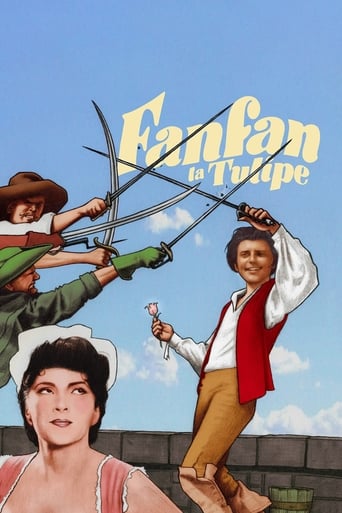"Fanfan la Tulipe," a 1952 cinematic gem co-produced by Amato Produzione and Filmsonor in France and Italy, is a swashbuckling adventure that captures the essence of post-war European cinema. Directed by Christian-Jaque, the film stars the charismatic Gérard Philipe as the titular character, a charming rogue who embarks on a journey filled with romance, humor, and daring escapades. Set against the backdrop of 18th-century France, the story follows Fanfan as he is tricked into joining the army by a cunning recruiter, only to find himself entangled in a web of love and destiny with the beautiful Adeline, played by Gina Lollobrigida. The film's vibrant energy and playful spirit are evident from the opening scenes, where Fanfan's acrobatic feats and quick wit set the tone for the adventure to come. The screenplay, penned by René Wheeler and Henri Jeanson, skillfully blends elements of comedy and drama, creating a narrative that is both entertaining and emotionally engaging. The chemistry between Philipe and Lollobrigida is palpable, adding depth to their characters' evolving relationship and driving the plot forward with a mix of tension and tenderness. Cinematographer Christian Matras's work is noteworthy, as he masterfully captures the lush landscapes and bustling towns of France, enhancing the film's visual appeal. The use of color in "Fanfan la Tulipe" is particularly striking, with vibrant hues that bring the period setting to life and complement the film's lively atmosphere. The costume design, overseen by Georges Wakhévitch, is equally impressive, with elaborate outfits that reflect the era's fashion and contribute to the overall authenticity of the production. "Fanfan la Tulipe" not only stands as a testament to the talents of its cast and crew but also as a reflection of the cultural zeitgeist of the early 1950s. The film's themes of freedom, love, and destiny resonate with audiences, offering a timeless tale that continues to captivate viewers. Its success at the box office and its enduring popularity are a testament to its status as a classic of French and Italian cinema, showcasing the collaborative brilliance of its multinational production team.
Año1952
Duración102 minuto
GénerosRomanceAventuraComediaBélica
Países de producciónFranceItaly
